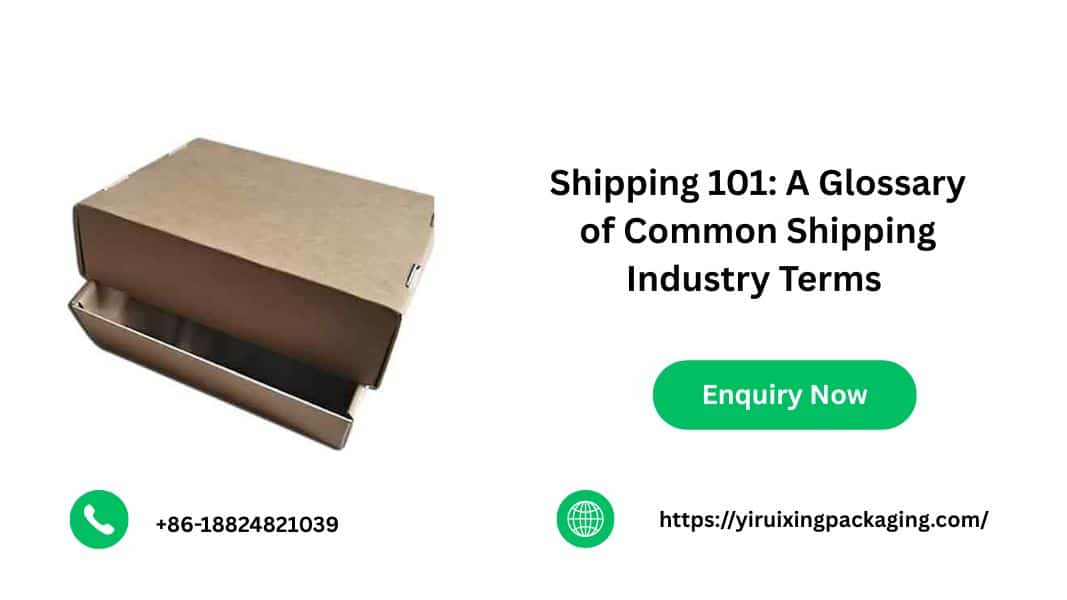Shipping 101: A Glossary of Common Shipping Industry Terms – Keeping track of the shipping industry can be tricky if you’re new to logistics, global trade, or online retail. With its complex network of terms, abbreviations, and specialized language, you might feel confused. That’s why we’ve put together Shipping 101: A Glossary of Common Shipping Industry Terms, your complete guide to understanding the language of worldwide shipping. Whether you run a business, manage a supply chain, or just need to send items abroad, this glossary will help you get to know key terms and boost your shipping know-how.
Table of Contents
ToggleMain Shipping Industry Terms
1. Freight
Freight refers to goods moved in large quantities by truck, train, ship, or plane. It also means the costs linked to moving these goods.
2. Carrier
A carrier is a company that moves cargo from one location to another. This can include sea carriers, air carriers, and land carriers.
3. Bill of Lading (BOL)
The Bill of Lading is a legal document between the shipper and the carrier. It acts as a receipt for the shipment, a transport contract, and a title document.
4. FOB (Free on Board)
FOB is an Incoterm that points out when ownership and liability for goods shift from seller to buyer. FOB origin, as an example, means the buyer takes on responsibility once the goods leave for shipping.
5. CIF (Cost, Insurance, and Freight)
CIF is another Incoterm where the seller pays for the cost, insurance, and freight to get the goods to the destination port. The buyer takes over responsibility after that point.
6. Demurrage
Demurrage means the charges that pile up when cargo stays at the port or terminal longer than the free time allowed. It aims to stop unnecessary holdups in cargo pickup.
7. Detention
People often mix up detention with demurrage. Detention is the fee a shipper has to pay for keeping equipment longer than the time they agreed on.
8. HS Code (Harmonized System Code)
HS Codes are international classification codes that help identify products during customs processing. Each product has its unique code that sets the duty rates and rules for import and export.
9. Customs Broker
A customs broker is a licensed expert or company that helps importers and exporters get their goods through customs. They handle paperwork, taxes, and ensure everything complies with the rules.
10. Manifest
A shipping manifest is a detailed list that shows all the cargo on a vessel, truck, or aircraft.
Understanding Shipping Documents: Commercial Invoice
This is a detailed bill provided by the seller to the buyer that describes the products sold, their price, and the agreed terms. It is the main document that customs authorities use to set the amount of duties and taxes.
Packing List – A packing list is the document that travels with the shipment and is a detailed breakdown of each package or container. It is very useful while customs clearance and inventory checks take place.
Certificate of Origin – It is a paper which if carrying the goods are the place of they goods production produced. The document is one of the requirements of certain countries for classifying the duty rates or for compliance with the trade agreements.
Common Shipping Modes: FCL (Full Container Load)
Such a term is used when the container is being filled by one shipper. It is cheaper for large shipments.
LCL (Less Than Container Load) – An LCL shipment means that the loading of the container is usually more than one. It is a good opportunity for small shipments, but it may take longer due to additional handling.
Air Freight – Sending goods by air is faster than any other means, but also more expensive. The most suitable situation is for the small-volume, high-value products.
Ocean Freight – It is the most economical way to ship internationally in large volumes. It covers both FCL and LCL categories.
Shipping Parties Explained
Shipper – A person or firm sending the goods
Consignee – The recipient of the goods.
Freight forwarder – An agent who arranges shipping services and coordinates between different transportation models.
3PL (Third-Party Logistics Provider) – A firm that manages warehousing, transportation, and logistics on behalf of a client.
Common Shipping Acronyms
ETA – Estimated time of arrival
ETD – Estimated time of departure
POD – Proof of delivery
BOL – Bill of lading
TEU – Twenty-foot equivalent unit (a standard measurement for container capacity)
CBM – Cubic Meter (used to measure volume)
Shipping Costs Overview
Understanding the components of your shipping costs is important –
Freight Charges – The core cost of transporting goods.
Fuel Surcharges – Fees to account for fluctuating fuel prices.
Terminal Handling Charges (THC) – Fees for loading/unloading at ports.
Customs Duties and Taxes – Government-imposed charges based on product type and value.
Insurance – Optional but suggested to protect against loss or damage.
Tips for New Shippers
Know Your Incoterms – These define the roles and responsibilities in international trade.
Label Clearly – Accurate labeling prevents delays and ensures smooth customs clearance.
Use a Freight Forwarder – They simplify the process, specifically for international shipments.
Track Your Shipment – Use tracking tools for visibility and better customer communication.
Avoid Peak Seasons – Shipping costs and delays increase during holidays and global trade surges.
Conclusion
Understanding shipping terminology can make a world of difference when you are managing logistics or growing your business. With this shipping 101: A glossary of common shipping industry terms, you are now better equipped to communicate confidently, avoid expensive mistakes, and make informed decisions. Whether you are shipping across the country or around the world, mastering the language of shipping is your first step toward success.
FAQs
What is the difference between freight and shipping?
Freight mainly refers to bulk goods transported by land, sea, or air, while shipping is a broader term that includes all types of cargo movement, including smaller packages.
Do I need a customs broker for international shipping?
Yes, a customs broker is highly recommended to navigate complex regulations and ensure smooth customs clearance.
What is the most affordable shipping method?
Ocean freight is the most cost-effective for large, non-urgent shipments. LCL is perfect for smaller loads.
Why are Incoterms essential?
Incoterms clearly define the responsibilities of buyers and sellers, helping avoid confusion, delays, and extra costs during international trade.





